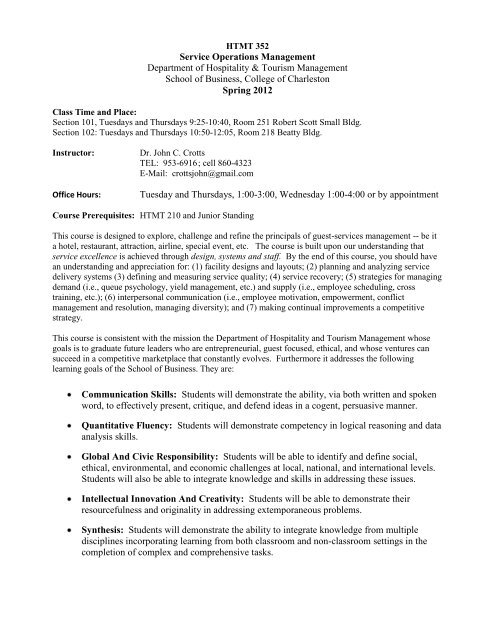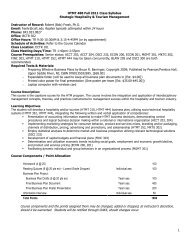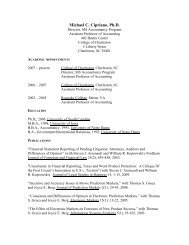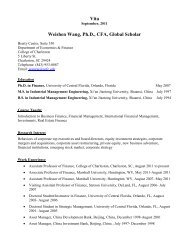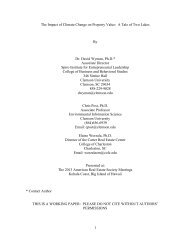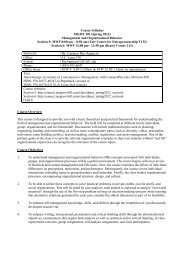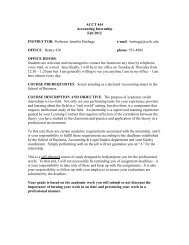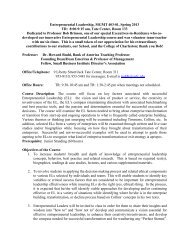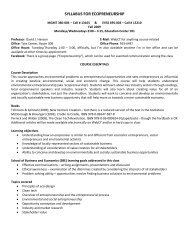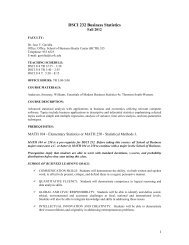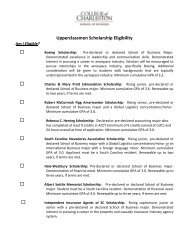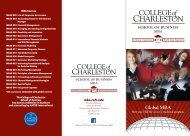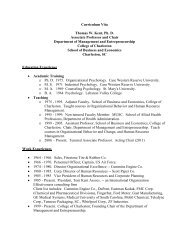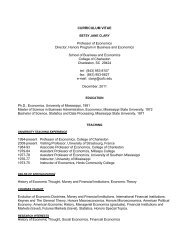HTMT 352-001 Dr. John Crotts - School of Business - College of ...
HTMT 352-001 Dr. John Crotts - School of Business - College of ...
HTMT 352-001 Dr. John Crotts - School of Business - College of ...
Create successful ePaper yourself
Turn your PDF publications into a flip-book with our unique Google optimized e-Paper software.
<strong>HTMT</strong> <strong>352</strong><br />
Service Operations Management<br />
Department <strong>of</strong> Hospitality & Tourism Management<br />
<strong>School</strong> <strong>of</strong> <strong>Business</strong>, <strong>College</strong> <strong>of</strong> Charleston<br />
Spring 2012<br />
Class Time and Place:<br />
Section 101, Tuesdays and Thursdays 9:25-10:40, Room 251 Robert Scott Small Bldg.<br />
Section 102: Tuesdays and Thursdays 10:50-12:05, Room 218 Beatty Bldg.<br />
Instructor: <strong>Dr</strong>. <strong>John</strong> C. <strong>Crotts</strong><br />
TEL: 953-6916 ; cell 860-4323<br />
E-Mail: crottsjohn@gmail.com<br />
Office Hours: Tuesday and Thursdays, 1:00-3:00, Wednesday 1:00-4:00 or by appointment<br />
Course Prerequisites: <strong>HTMT</strong> 210 and Junior Standing<br />
This course is designed to explore, challenge and refine the principals <strong>of</strong> guest-services management -- be it<br />
a hotel, restaurant, attraction, airline, special event, etc. The course is built upon our understanding that<br />
service excellence is achieved through design, systems and staff. By the end <strong>of</strong> this course, you should have<br />
an understanding and appreciation for: (1) facility designs and layouts; (2) planning and analyzing service<br />
delivery systems (3) defining and measuring service quality; (4) service recovery; (5) strategies for managing<br />
demand (i.e., queue psychology, yield management, etc.) and supply (i.e., employee scheduling, cross<br />
training, etc.); (6) interpersonal communication (i.e., employee motivation, empowerment, conflict<br />
management and resolution, managing diversity); and (7) making continual improvements a competitive<br />
strategy.<br />
This course is consistent with the mission the Department <strong>of</strong> Hospitality and Tourism Management whose<br />
goals is to graduate future leaders who are entrepreneurial, guest focused, ethical, and whose ventures can<br />
succeed in a competitive marketplace that constantly evolves. Furthermore it addresses the following<br />
learning goals <strong>of</strong> the <strong>School</strong> <strong>of</strong> <strong>Business</strong>. They are:<br />
Communication Skills: Students will demonstrate the ability, via both written and spoken<br />
word, to effectively present, critique, and defend ideas in a cogent, persuasive manner.<br />
Quantitative Fluency: Students will demonstrate competency in logical reasoning and data<br />
analysis skills.<br />
Global And Civic Responsibility: Students will be able to identify and define social,<br />
ethical, environmental, and economic challenges at local, national, and international levels.<br />
Students will also be able to integrate knowledge and skills in addressing these issues.<br />
Intellectual Innovation And Creativity: Students will be able to demonstrate their<br />
resourcefulness and originality in addressing extemporaneous problems.<br />
Synthesis: Students will demonstrate the ability to integrate knowledge from multiple<br />
disciplines incorporating learning from both classroom and non-classroom settings in the<br />
completion <strong>of</strong> complex and comprehensive tasks.
Required Readings<br />
Readings on OAKS<br />
Academic Integrity<br />
The <strong>College</strong> <strong>of</strong> Charleston’s Student Honor Code is in effect in this course. Any student caught cheating will<br />
receive a failing grade in the course and additional appropriate action will be taken. Cheating includes<br />
copying someone else's work in the exams, quizzes, cases, and assignments. It includes using notes and other<br />
aides during exams, using someone else's ideas without referencing them, turning in an assignment for this<br />
class that was turned in whole or part for another class. Cheating also includes students that allow their work<br />
to be copied or who do work for another individual. If you are unclear about what is considered cheating<br />
what is not considered cheating, please see the instructor.<br />
Grading Grades<br />
A 93-100<br />
Observational Case (1) 10 A- 91-92<br />
Fact-Sheets (2) 30 B+ 88-90<br />
Pop Quizzes (5) 20 B 82-87<br />
Exam(2) 40 B- 80-81<br />
100 C+ 78-79<br />
C 72-77<br />
C- 70-71<br />
D+ 68-69<br />
D 62-67<br />
F 61 or below<br />
Class Attendance and Participation<br />
Class attendance is expected. Students are responsible for all content and assignments for each class. See<br />
next section.<br />
Quizzes (5)<br />
Five quizzes will be administered this semester on random days based on the reading to be covered<br />
that day in class. Some <strong>of</strong> the quizzes will be drawn from cases and exercises covered in class,<br />
while others will be composed <strong>of</strong> one <strong>of</strong> the discussion questions for each reading. No makes up<br />
quizzes are available. Each quiz will be worth 5 points. The lowest quiz grade will be dropped.<br />
Exams<br />
A mid-term and final exam will be given. A number <strong>of</strong> the questions will be drawn from the<br />
discussion questions for each reading while the remaining questions will be drawn from information<br />
presented in class (e.g., lectures, case studies, guest speakers etc).<br />
Observational Case Analysis<br />
In teams <strong>of</strong> three, conduct one (1) <strong>of</strong> the three (3) living cases found on the last page <strong>of</strong> this course syllabus.<br />
These living cases are designed to enhance the courses foundation on building competitive advantage<br />
through quality. In our September 12 class, you will turn it in and be prepared to discuss your case. Each<br />
paper should be 3-4 pages or moreover represent a full response to the situation/concept you have selected to<br />
observe. Contrary to the old adage "Don't judge a book by its cover," written summarizes should be<br />
pr<strong>of</strong>essional in appearance.
Fact Sheets<br />
This is not a group project. The project entails the selection <strong>of</strong> two service operations management topics to<br />
research from the list <strong>of</strong> provided, culminating in two short written fact sheets. An example <strong>of</strong> an acceptable<br />
fact-sheet is provided on OAKS. The purpose is to provide you an opportunity to delve into a topic to a<br />
deeper extent than the readings and class time.<br />
Format <strong>of</strong> one Fact-Sheet:<br />
1-2 sentence fact found in the academic<br />
research literature (peer reviewed. Therefore, 1-2 sentence tip based upon the fact.<br />
Each tip-fact sheet contains a minimum <strong>of</strong> 10<br />
(preferably 12) <strong>of</strong> these facts in a bullet<br />
format followed by a reference list.<br />
• Choose your first from topics 1-5, and second from topics 6-10.<br />
• Each Fact-sheet must be presented in class by the author to be graded.<br />
• Each Fact-sheet must contain at least 4 cited peer reviewed journals articles or book sources.<br />
• A single source cannot be cited more than three times.<br />
• No direct quotes are permitted, nor referencing any <strong>of</strong> the assigned readings as a source.<br />
• Each fact sheet should contain no less than 10 facts in a bullet format followed by a reference list.<br />
• Reference lists should be formatted in accordance with the APA style<br />
• They will be evaluated as to their insightfulness, understandability, relevance to HTM<br />
TOPIC OUTLINE: Subject to change by the instructor<br />
Turn in your Fact-<br />
Sheet on the assigned<br />
due dates and be<br />
prepared to briefly<br />
discuss them in class<br />
when called upon<br />
Date Topic<br />
August 21 Course Overview<br />
Implementing Quality Service through Design, Systems & Staff<br />
23 Reading 1 - The basics <strong>of</strong> the WOW experience<br />
Identifying and measuring key drivers <strong>of</strong> guest satisfaction<br />
28 Reading 2 – The customer delight principle<br />
30 Reading 3- Meeting guest expectations through planning<br />
September 4 In Class Exercise: Bring to class laptops if you have one<br />
6 Observational Cases 1, 2, 3<br />
11 Reading 4: The Service Pr<strong>of</strong>it Chain<br />
Implementing Service Quality Through Design and Systems<br />
13 Readings 5: Designing the Servicescape: Setting the Scene for the Guest<br />
18 Walking tour with Shannon Hall, Shannon Hall Designs<br />
20 Reading 6 - Planning and Analyzing Delivery Systems
25 Guest Speaker: Vipin Menon, Director <strong>of</strong> Catering Conference Services &<br />
Banquet Operations, The Sanctuary at Kiawah Island Golf Resort<br />
27 Reading 7: Managing Quality, Labor Costs and Labor Scheduling<br />
October 2 Reading 8: Managing Guest Waits<br />
4 Case Study: Playa Dorada Tennis Club: Expansion Strategy<br />
9 Exam 1<br />
12 Open<br />
13-15 Mid-Term Break<br />
Implementing Service Quality Through Staff<br />
16 Reading 9: Understanding Organizational Culture<br />
15 In class case study: The Panalba Case<br />
18 continued<br />
23 Reading 10: Aligning Organizational Processes with Mission<br />
25 Reading 11- Staffing & Reading, & Reading 12- Motivation<br />
30 Case: Harrah’s Entertainment Inc.: Rewarding our People<br />
November 1 Reading 13- Co-Production<br />
6 No Class: Election Day<br />
8 Reading 14- Service Delivery/ Service Recovery<br />
13 Reading 15- Measuring Service Quality<br />
15 Guest Speaker: Mickey Bakst, Manager, Charleston Grill<br />
20 Reading 16 – Achieving Service Excellence<br />
22<br />
27<br />
29 Review for final exam<br />
December 6 9AM, Final Exam- for section 01 (9:25 class) OR<br />
8 9AM, Final Exam- for section 02 (10:50 class)<br />
Topics for Fact-Sheets (choose 2)<br />
The libraries databases <strong>of</strong> online journals will be invaluable for this project; particularly the Hospitality &<br />
Tourism Index and <strong>Business</strong> Source Premier found at http://www.c<strong>of</strong>c.edu/library/find/databases/index.php.<br />
Google Scholar will also be a good source for Topic 9. It is important to me that you do not wait until the<br />
last 3 topics to turn in and submit your 2 fact sheets. Choose your first from topics 1-5, and second from<br />
topics 6-10. Again, no factsheet will be accepted if it is not presented in class by the author or turned in late.<br />
Topic Due Date<br />
Topic 1: Customer Satisfaction, Customer Delight, or Service Surprise Aug 28<br />
Topic 2: Service-Pr<strong>of</strong>it Chain Sept. 11<br />
Topic 3: Servicescape, Physical Environment, Music, Color, Ambient<br />
Conditions, Temperature, or Sensory Marketing Sept. 13<br />
Topic 4: Pert charts, Gantt charts, Blueprinting services, or Fishbone analysis Sept. 20<br />
Topic 5: Total quality management, Labor scheduling, Labor costs, or<br />
Forecasting Demand Sept. 27<br />
Topic 6: Queue psychology, Managing queues or waits Oct. 2<br />
Topic 7: Workplace environment, organizational culture Oct. 16
Topic 8: Employee Empowerment, Employee Motivation, or Employee<br />
Engagement October 25<br />
Topic 9: Co-Production, Customer as co-producer Nov.1<br />
Topic 10: Service Recovery Nov. 8<br />
Observational and Analysis Cases<br />
Choose One <strong>of</strong> the Following:<br />
1. Conduct a mystery shop examining a servicescape <strong>of</strong> your choice <strong>of</strong> an upscale hotel lobby,<br />
restaurant, or c<strong>of</strong>fee shop in the Charleston area. Evaluate the firm through a detailed mystery shop<br />
form you design the service environment on its architecture, layout, interior design, furnishings,<br />
cleanliness, background sounds (music etc), and aromas as well as the service in terms <strong>of</strong> staff<br />
appearance, competence, and helpfulness. Include in your rating scales open ended comments on all<br />
<strong>of</strong> the above. In addition, comment if all these elements work together. I encourage you to read<br />
ahead to Readings 5 and reflect these authors’ comments into your evaluations.<br />
2. The principles <strong>of</strong> guestology are not confined to the luxury segments <strong>of</strong> the hospitality industry as<br />
evidenced by Chick-Fila, Inc. applying them as a test in their Mount Pleasant restaurant. Conduct a<br />
mystery shop <strong>of</strong> this restaurant as well as one in its competitive set (e.g., Arby’s, McDonalds,<br />
Zaxaby’s, etc). What are the similarities as well as the differences. What impact do you believe the<br />
strategy has on this Chickfila’s customers in terms <strong>of</strong> demand, loyalty, and willingness to pay? What<br />
do you believe are the key drivers?<br />
3. Visit Nason Emergency Medical Clinic (in Mount Pleasant, West Ashley or North Charleston) and<br />
compare the patient experience with those in a typical hospital emergency room. How do they<br />
compare; including what does it mean to patients and how does it impact the clinic financially?<br />
What do you see have they borrowed from the hospitality industry? What could they improve? I<br />
encourage you to read ahead to Readings 5 and reflect these authors’ comments into your<br />
evaluations.


